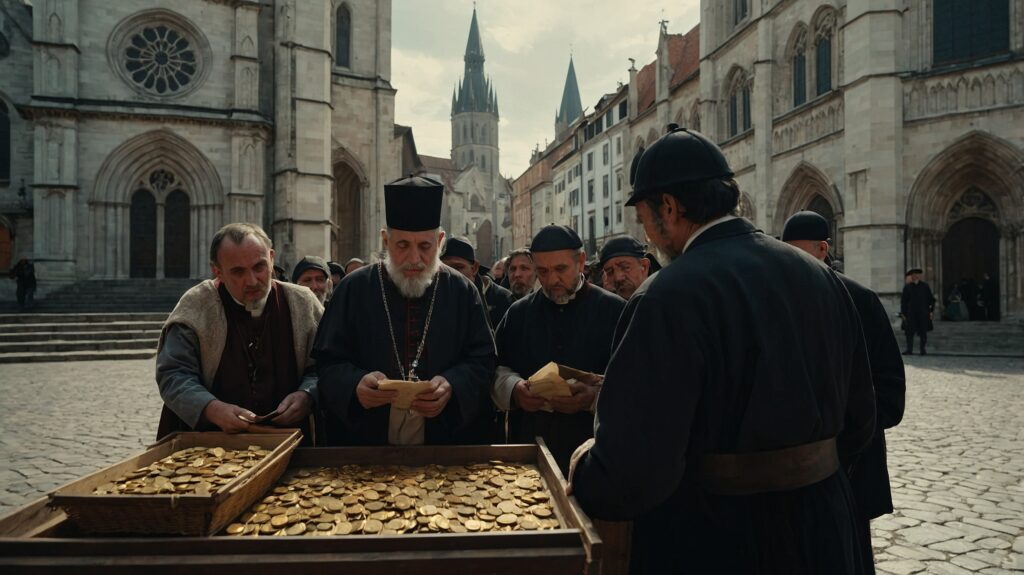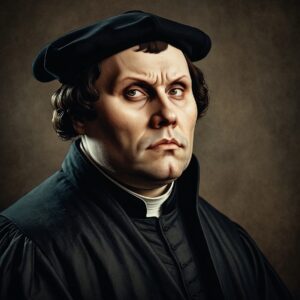This is how Martin Luther forged a perspective that reshaped an entire continent. The scene was set in 1517—Europe was gripped by centuries of Catholic dominance. The Church, with its vast wealth and power, stood as the unquestioned authority over not just religion, but politics and social order. Its influence was felt in every corner of life, and anyone who dared challenge it was branded a heretic, often with disastrous consequences. But Martin Luther, a German monk with an unshakable conviction, refused to remain silent.

At the heart of his outrage was the practice of indulgences—the Church’s way of offering “salvation for sale.” With a payment to the Church, people were told their sins could be forgiven, and their deceased loved ones could be freed from purgatory. It was a system designed to prey on the faithful, to bleed them dry under the guise of holiness. The corruption was everywhere, but no one dared to openly oppose it.
No one, except Luther.

A Bold Act: Forging a New Perspective
Luther’s rebellion began not with fire and brimstone, but with 95 simple, carefully chosen words. In October 1517, he nailed his 95 Theses to the door of Wittenberg Castle Church, igniting a spark that would soon engulf all of Europe. What were these words? They were a direct attack on the Church’s practice of selling indulgences, and more broadly, a challenge to the very foundation of Catholic authority.
Luther’s argument was revolutionary: salvation could not be bought, sold, or earned through Church rituals. Instead, it was a matter of faith alone. This was a radical idea—faith, not the Church, was the path to God. It was a concept that stripped away the Church’s monopoly on grace and forgiveness.
And for the people of Europe, it was a revelation.
The Ripple Effect: Breaking the Church’s Grip
Once Luther’s words spread, there was no turning back. His ideas quickly moved beyond theological debate and became a call to action. Towns and villages throughout Germany began questioning the Church’s power, emboldened by Luther’s defiance. His writings—fueled by the printing press, a new technology at the time—spread like wildfire. In homes, marketplaces, and churches, people discussed Luther’s perspective, many for the first time realizing they had the right to question authority.
It was more than a religious reformation. Luther’s actions set off a cultural and political revolution. The Catholic Church’s dominance over Europe began to fracture, and with it, the political power it held over kings and emperors weakened. The Protestant Reformation, as it would later be known, became a defining moment in European history. Wars would be fought, kings would fall, and millions of lives would change—all because Luther dared to say no to the Church’s authority.
The Philosophical Shift: A Worldview Transformed
Luther’s challenge didn’t stop at indulgences. His ideas fundamentally transformed the way people thought about religion, faith, and personal responsibility. No longer did people believe they needed priests or Church-sanctioned rituals to mediate their relationship with God. Luther’s perspective was radical in its simplicity: each person could have a direct, personal relationship with the divine. This new interpretation of faith, known as sola fide (faith alone), encouraged people to take responsibility for their own salvation, free from the control of any earthly institution.
This philosophical shift was monumental. It weakened the Church’s monopoly on knowledge and interpretation, opening the door for a more personal, individualized approach to religion. The Bible was translated into local languages, allowing people to read and interpret scripture for themselves, no longer reliant on priests to explain its meaning. This decentralization of religious authority not only changed how people worshipped but also how they thought about power and governance.
The Battle Lines Drawn: A Church in Crisis
But Luther’s rebellion didn’t come without consequences. His ideas were seen as a direct threat to the Catholic Church’s authority, and it wasn’t long before he faced fierce opposition. Luther was excommunicated in 1521, branded a heretic by the Church, and forced into hiding for fear of execution. The Church wanted to crush his movement, but it was too late. Luther had unleashed something far greater than himself.
The Protestant Reformation, born from his ideas, led to the fragmentation of Christianity into multiple sects—Lutheranism, Calvinism, and others. Europe became a battleground for religious warfare, with rulers forced to choose sides between Catholicism and the newly formed Protestant sects. The Thirty Years’ War, one of the bloodiest conflicts in European history, was partly a result of these religious tensions. Luther may not have intended to create such turmoil, but his challenge to the Church had permanently altered the course of history.
A Legacy of Religious Freedom and Individual Thought
What Martin Luther set in motion was far more than a religious debate—it was the dawn of a new era of freedom and individual thought. His actions laid the groundwork for what would later become key principles of modern Western society: religious freedom, personal responsibility, and the right to question authority. These ideas, sparked in the 16th century, would echo through time, influencing movements for civil liberties, democracy, and the separation of church and state.
Today, we live in a world where freedom of religion and personal belief is a fundamental right in many parts of the globe. We owe much of that freedom to Martin Luther, who dared to challenge the dominant perspective of his time and forged a new one, built on the principles of faith, individual autonomy, and justice.
Share your thoughts in the comments below. Together, let’s continue Luther’s legacy by challenging the powers that be and forging a future built on freedom, justice, and equality.
Martin Luther’s fight reminds us that change often begins with a single voice challenging an entrenched system. His willingness to question authority and push back against corruption resonates with the struggles many face today. Think about the institutions in your life—be it government, religion, or social norms—that hold undue power. What practices or beliefs are being upheld simply because “that’s how it’s always been”?
Ask yourself: What authority needs to be questioned in today’s world? What outdated systems need to be challenged? Luther’s story teaches us that change is possible, but it starts with one person daring to speak up, even when the odds are overwhelming.
